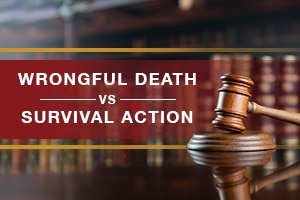After losing a loved one because of someone’s negligence, survivors often have different legal options to get justice for their loss. The criminal justice system holds at-fault parties responsible for crimes that lead to death. But civil courts can also be used to hold at-fault parties responsible for the financial consequences of a death.
Using civil court procedures after a death usually involves one of two paths—survival actions and wrongful death claims. These two approaches are very different, so if you’ve lost a loved one, knowing which one applies to your situation and goals can help you find the best path to seeking compensation.
Wrongful Death vs Survival Action in Georgia and Alabama
At the Law Offices of Gary Bruce, we represent people who are dealing with the loss of a loved one throughout Georgia and Alabama. The laws in both states regarding wrongful death claims are different. You can see Gary Bruce’s Legal Break video on wrongful death claims to hear him break down what these claims entail.
To summarize: wrongful death claims focus on the damages suffered by the deceased’s loved ones, while survival actions focus on the damages suffered by the deceased before they died.
Understanding Wrongful Death Claims in Georgia and Alabama
In a Georgia wrongful death claim, legal action is taken by the survivors of the deceased, such as the spouse, children (if there is no spouse), parent (if there is no spouse or child), or administrator of the deceased’s estate (if there is no spouse, child, or parent).
In an Alabama wrongful death claim, only a personal representative of the deceased’s estate may file a claim, and all damages are paid to the estate. EVERY CASE IS DIFFERENT and talking to a lawyer about the particular situation you face is important to make sure you understand the law. This post is not a substitute for a meeting with a lawyer to discuss the particulars of your situation.
The person or persons filing the wrongful death claim must prove that the death was caused by negligent, reckless, intentional, or criminal actions of the allegedly at-fault party.
In a Georgia wrongful death claim, damages might include:
- Lost wages (current and future losses) that the deceased would have provided had it not been for the accident.
- Any benefits the deceased would have earned, such as insurance policies or retirement.
- Any loss of support, companionship, consortium, and counsel that would have been provided by the deceased.
In Alabama, only punitive damages can be pursued in a wrongful death case. This means that damages intended to “punish” the at-fault party are awarded, but compensatory damages (strictly financial costs) are not. But, as we mentioned above, it is important to discuss this matter with a lawyer before making a decision about how to proceed.
Understanding Survival Actions in Georgia and Alabama
In a survival action, a personal representative of the deceased’s estate typically takes legal action. This process is similar to that of a personal injury claim, but one in which the injured person has died. In a survival action, the estate is seeking compensation for:
- Medical expenses
- Funeral costs or other end-of-life costs
- Other financial losses
- Pain and suffering
Both Actions Can Be Pursued Even If a Crime Wasn’t Committed
If a person or persons are accused of a crime related to death and acquitted, it doesn’t mean that surviving loved ones can’t take legal action. Both survival actions and wrongful death cases are pursued in civil court, which means that they will be considered separate from criminal cases in the eyes of the law.
Contact a Georgia and Alabama Wrongful Death Attorney Today
At the Law Offices of Gary Bruce, we help clients with wrongful death claims, and we understand how important these cases are for people who have lost a loved one. If you’re considering taking legal action, contact us today to schedule a free, no-obligation case assessment.
